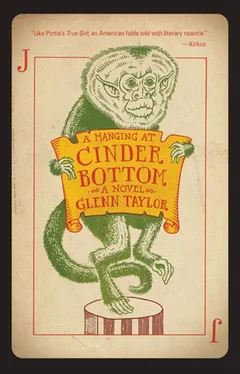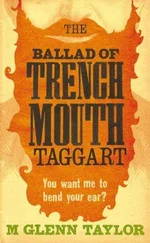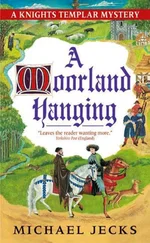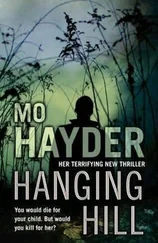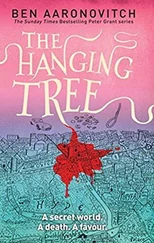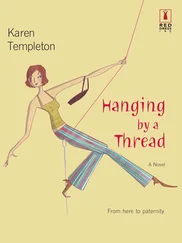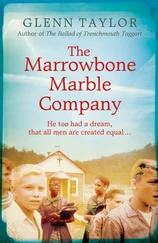He wore a yellow swallowtail dresscoat and a purple flowered cravat. His skin was pale and his tonic-slicked hair a reflective black.
He surveyed the quiet audience before him, turned away from their upturned faces, and bowed toward the curtain. Still bent at the waist, he called out, “Now the automobile, with a backfire,” and he lifted the tails of his coat and sent forth with wondrous might a continuous blast of odorless gas. It issued from his anus with the clear tone of a combustion engine, and it ended with an impossible clap that startled those in front. When they recovered from their startle, they began to laugh heartily in a chorus. The chorus rose as the reality of what they’d seen set in, and they only quieted when L’homme Péter looked over his shoulder and said, “Now for the Yankee Doodle.” They waited in disbelief. He played it in perfect time and pitch. Some bent double with laughter then. One man left in disgust. For any who questioned the sound’s origin, L’homme Péter took a paper sleeve of talcum powder and emptied it over the up-pointed seat of his black breeches. He called, “The Waltz!” and a cloud of fine white particles burst upon the gaslit air, spinning as they fell.
It was as if he’d swallowed an accordion.
They called him out with savage claps and high whistles for an encore, and behind the curtain Goldie fed him another swallow of Tony Thumbs’s patented Fart Juice, though L’homme Péter didn’t need it. He’d been born with a gift — the fart juice only stirred propulsion. He threw open the curtain, bent again before them, and played the snake-charmer song until their bellies clinched and their eyes watered from laughter.
At five, a yellow-haired Norwegian woman took the stage wearing only three bleached sand dollars held by kite string over her unmentionables. She sat on a barstool with the handle of a thirty-inch handsaw gripped in her knees and pulled a cello’s bow across the back of the blade. It sang high weary lullabies until more than one silent man imagined he’d found his bride.
In the storeroom, behind a wall newly framed and bricked by Frank Dallara, a pretend game of seven-card stud proceeded slow and quiet. Three of the five men half-played their hands, but they didn’t give a damn about the outcome.
One of them steadily dozed. His shoulder twitched. He breathed through his mouth.
Little Donnie Staples was wayworn, and so it was easy to sleep upright in a hard-seat chair. In ordinary times, he worked his twenty-hour shift at the Oak Slab, slept for four, and was back at the table for another twenty, all the while winning, if he had a mind to. But these weren’t ordinary times. There were no four hours on a feather mattress. There was only a chair.
By then he was accustomed to hard-seat-chair-beds and big-city-actor talk and the lessons of a first-rate confidence man and his card-throwing woman. He’d even grown accustomed to the elaborate and constant predicting of another man’s whims.
For two weeks he’d been told two things about sleep: you can do it when you’re dead, and until then, you can do it in a chair for a half hour, twice nightly, between the hours of five and seven AM. It had proved true, and Little Donnie had begun catching his double-thirty winks in a chair-bed, and he’d maintained control of his faculties sufficient to keep winning at the Oak Slab too.
He awoke from his straight nap to the sound of a comet-gas believer screaming, “I see it! I see it in the air dust!” He one-eyed his timepiece. He stretched and stood. Trent would be anxious for another report. Each morning, he told Trent and Rutherford how he still slow-roped the big mark, how he would keep alive his trickled losing streak until the mark pulled from his jacket the property deed Abe was sure he’d bring. They knew the Chicago mark as Phil, and they were after the man’s eight-story office building on West Superior Street. They knew him to be hooked on Keystone’s charms, and presently they would lure Chicago Phil to the Oak Slab, where they’d take more off his hands. They did not suspect the man was only a tale.
The yellow-haired Norwegian finished her set and lifted, ever so briefly, the twin sand dollars covering her nipples. She shot behind the curtain as the men whistled and hooted. Goldie emerged in her place and hollered to the crowd that Saw Girl would be here all week. She declared comet shots to be half price until seven. “You can sleep after you’re dead!” she called.
Behind the curtain, she took Saw Girl by the shoulders and said to her, “You only lift those sand dollars once, and you only do it at the end of the show. Then you get off quick.”
The girl had a condition that caused her to look through people and to not hear what they said to her. She nodded.
Goldie knew the girl spoke English. “You hear me?” she said.
“Do I not do it just the way you say already?” Even to her own ear, the voice was childish, but she went on anyway. “Do I not?”
The skin beneath her makeup was waxen. It was opium skin.
Goldie made a note to send Saw Girl packing. Back to Baltimore with money in her pocket.
On her way to the storeroom, she spotted Cheshire Whitt tending bar with Sam. She slipped him the write-up for the Sunday and Monday editions. She told him to take his post out front. Her step had spring. She noted the positions of Alva Smith and Rose Cantu, her two most educated ladies. Each was on the lap of a rich man at the main room’s poker table. Each batted her eyes slow for effect. On the promise of Goldie’s good money, Alva and Rose would play it this way for three hours, and then they’d slip out the back, replaced by Goldie’s next two smartest ladies, who’d do the same, and so on. There was no coitus whatsoever involved, and thusly it was a much-sought-after shift for the working girls of Fat Ruth Malindy’s. And the rich men from Bramwell and beyond could not wipe from their minds the pretty gals with the eyelashes who’d up and disappeared. It was enough to make a man come back to A. L. Baach & Sons Saloon. It was enough to make him tell his friends.
Goldie had found something lost to her a decade before. It was a spirited way of being, and it was better than before. Abe had learned in his years gone to tamp down those reckless habits that had previously sabotaged their livelihood. Now there was more thinking than drinking, more talking than fornicating, though all things in moderation were appreciated. It was the sureness of it all that she most favored. The ridiculous certainty that they would come out on top, alive. Only once had she made mention of their endeavor as something fraught with peril. “We might be between the hammer and the anvil on this one,” she’d said, and Abe had only kept doing what he was doing. He was practicing his card manipulations before a mirror, watching his own hands. He’d answered: “Well, lion’s got to roar.”
She met Little Donnie and Abe at the whiskey barrel in back of the storeroom. It was empty. It had a head but no bottom, and under it was the three-foot fireproof safe bolted to the storeroom floor, the same safe she and Abe had long ago retreated to in times of mutual need.
Abe handed Little Donnie an envelope with five thousand dollars inside. He’d retrieved it from under the wardrobe’s hidden slat that very morning, leaving little behind for cushion. He said to the boy, “Give it to him straightaway in his office, alone. Use those good ears of yours and that lazy eye too. Use the mirror if need be.”
Little Donnie had never held such thickness inside an envelope. “This is five thousand?” he asked.
“Tell him that’s fifty percent of our touch. Tell him he needs to cut your three from that.”
The boy nodded and put the envelope in his jacket’s inside pocket.
Читать дальше
Конец ознакомительного отрывка
Купить книгу
